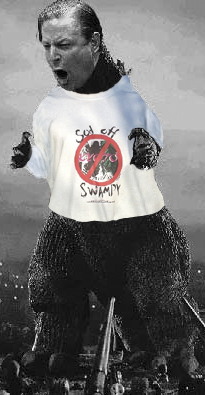Britain Must Admit “Mistake”
Somehow I don’t think so
RIYADH, Saudi Arabia (AP) – Iran’s foreign minister said Wednesday that Britain must admit that its 15 sailors and marines entered Iranian waters in order to resolve a standoff over their capture by the Mideast nation.
Like hell. Britain’s only mistake was not asking for the keys to the Enola Gay last week.

Or the Bock’s Car. Either one would do.
The mainstream media and even the blogosphere has bought this hook, line and sinker.
But there are two colossal problems.
A) The Iran/Iraq maritime boundary shown on the British government map does not exist. It has been drawn up by the British Government. Only Iraq and Iran can agree their bilateral boundary, and they never have done this in the Gulf, only inside the Shatt because there it is the land border too. This published boundary is a fake with no legal force.
B) Accepting the British coordinates for the position of both HMS Cornwall and the incident, both were closer to Iranian land than Iraqi land. Go on, print out the map and measure it. Which underlines the point that the British produced border is not a reliable one.
Before the spin doctors could get to him, Commodore Lambert said:
“There is absolutely no doubt in my mind that they were in Iraqi territorial waters. Equally, the Iranians may well claim that they were in their territorial waters. The extent and definition of territorial waters in this part of the world is very complicated”.
William Calley, even assuming they were in disputed territory as you suggest, it’s irrelevant. The proper response would have been first to direct the ship to leave, then to attempt to escort her out of (purportedly) Iranian waters, and then, if that failed, to arrest the ship under escort to port. Note, arrest the SHIP, not those aboard: this is a term of art under maritime law that happens all the time even in civil litigation involving merchant vessels. It does not involve a boarding party kidnapping her crew at gunpoint. A warship, unlike a merchant vessel, remains sovereign and inviolate regardless of where she may be, like an embassy. But, of course, we all know what Ahmadinejad & Co. think of embassies.
“…even assuming they were in disputed territory as you suggest, it’s irrelevant.”
Keep that in mind when you listen to the media case for why the Iranians ‘are in the wrong’ in the first place…
As for the maritime protocol territorial waters are under the jurisdiction of the state in question, and they have the authority to impose all relevant laws within their waters – this includes the power to arrest, and more, otherwise what mandate would the US Coastgaurd and similar organisations operate? The US government have abrogated themselves far more extensive powers in their territorial waters in relation to Cuba, and to civilian ships rather than military vessels. eg:
‘The Secretary is authorized to inspect any vessel, foreign or domestic, in the territorial waters of the United States, at any time; to place guards on any such vessel; and, with my consent expressly hereby granted, take full possession and control of any such vessel and remove the officers and crew and all other persons not specifically authorized by the Secretary to go or remain on board the vessel when necessary to secure the rights and obligations of the United States’
http://www.whitehouse.gov/news/r…0040226- 11.html
“But, of course, we all know what Ahmadinejad & Co. think of embassies.”
Probably the same as the US attitude to consulates…witness the invasion of the Iranian mission (invited by the Iraqi government) and kidnapping of Iranian consular staff by US forces.